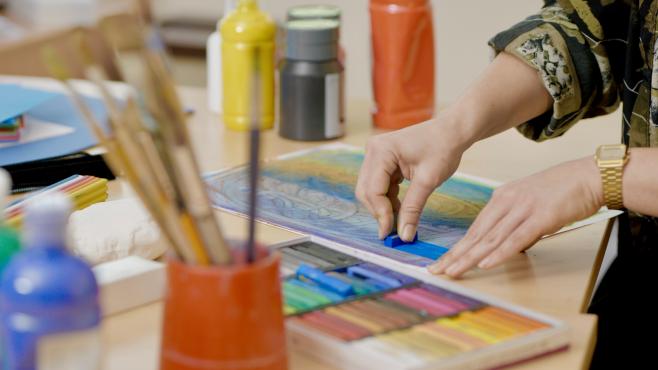You are here
Art, Drama and Music Therapists
Contents
Overview
This webpage highlights the collaborative approach for art, drama and music therapists between national allied health professions and psychological professions leadership. Working with the wider multi-disciplinary team to ‘make the biggest difference we can, together’ is crucial.
Background
Art therapists, dramatherapists and music therapists are all statutorily regulated professions. There are four protected titles: art therapist; art psychotherapist; dramatherapist; and music therapist. An art, drama or music therapist is a psychological therapist who has experience and training in psychological interventions using art, music or drama as their primary mode of communication.
They work in a variety of different settings, including primary and secondary NHS care, secure settings, educational settings, social care and the voluntary sector. They offer treatment to people of all ages within all services some of whom might otherwise find it challenging to engage with talking-based interventions. Their value and unique contribution to NHS mental health services and to individual wellbeing are not always well understood. As a result, people who might benefit from their interventions may not always receive the support they need.
Art, drama and music therapists often identify as both allied health professions (AHPs) and psychological professionals. Art, drama and music therapists will continue to be represented by AHP leadership nationally and regionally. Psychological professions and AHP leadership are committed to working together to ensure these professions thrive.
The psychological professions and AHP leadership will be collaborating to support art, drama and music therapists at a national and regional level (including through the regional Psychological Professions Networks - PPNs), for the benefit of patients. To achieve this, the collaboration will focus on improving the quality of patient care and experience, understanding and visibility of the professions, career development and professional support.
Frequently Asked Questions (FAQs)
1. How will this collaboration help patients?
Patients may not always receive the support they need. This collaboration will enable maximum impact of art, drama and music therapy across mental health and physical health services. This should mean improved patient choice, outcomes and cost-effective delivery of care by helping to ensure that patients receive the right intervention, at the right time to meet their needs.
2. Does the collaboration between the allied health professions and psychological professions leadership change the status of art, drama and music therapies?
No. There will be no change in status for art, drama and music therapies and these professions will continue to be AHPs and registered with the Health and Care Professions Council (HCPC). In addition, they are now recognised as psychological professions within the PPN networks.
3. How will this collaboration support the professionals?
The proposed collaboration is intended recognise that these professions may work within or across both professional groups in service, to improve understanding of art, drama and music therapists and the impact they can make across services and settings. It is hoped that this can improve and support service development, career development and progression by creating new opportunities for student placements, advanced practice and new opportunities.
4. How will this impact the learning opportunities, career progression and development of art, drama and music therapists?
Art, drama and music therapists may not always have a clear path to more senior, clinical, managerial or supervisory roles. The opportunity to be recognised across both professional groups and better integration with other psychological professions will give explicit support for art, drama and music therapists to access career support and progression through this group within mental health teams.
5. Why has this collaboration happened now?
Over the last few years, the British Association of Art Therapists, British Association of Dramatherapists and British Association for Music Therapy have been working with HEE and NHS England to maximise representation within allied health, as well as seek recognition of art, drama and music therapists as integral members of the psychological professions to truly reflect the work that many therapists are doing and the patient pathways.
It is a real step forward for patients and therapists that this is now agreed and supported effectively by both HEE and the PPNs. This will enable art, drama and music therapists to continue to benefit from formal professional leadership within the AHP grouping, whilst acknowledging their psychological professions identity too. The aim is for these occupations to have the ‘best of both worlds’, for the benefit of patients.
6. Will this collaboration dilute leadership for these vital professions?
No. This will collaboration strengthen leadership. Nationally the AHP and psychological profession leads will work collaboratively to maximise outcomes and prevent duplication or confusion.
Regionally and at system level, AHP regional, AHP faculty and PPN colleagues will work together, as many do already, to establish a shared way of working to ensure activity is coordinated. This is no different to how colleagues work with each other in service every day.
This reflects the reality for staff and people accessing services, with health inequalities a top priority this work has never been more important to get right.
Useful Information
- Psychological Professions Network website
- NHS England Allied Health Professions webpage
- HEE AHPs in Mental Health webpage
- HEE Psychological Professions webpage
- British Association of Art Therapists website
- British Association of Dramatherapists website
- British Association for Music Therapy
- Health Careers
- Contact: AHPnatprog@hee.nhs.uk
